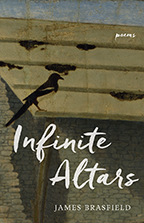Collected Poems: 1974 – 2004 by Rita Dove
W.W. Norton, 2016
432 pages, hard, $39.95

In reading Rita Dove’s National Book Award finalist, Collected Poems: 1974 – 2004, we bear witness to her maturation as both a woman and an award-winning poet. Dove opens this volume of seven books with a prologue, “In the Old Neighborhood,” set in her childhood home. The collected works are the ebb and flood of leavings, travel, and homecomings, hers and her personas’, and the lessons one learns over the course of lived experiences.
In the first of the seven included books, The Yellow House on the Corner (1980), narrative poetry is the dominant mode, as Dove reflects upon adolescence. The work is short and terse as compared to poetry published in later sections, and it can also be romantic and dreamy, such as in “This Life”:
With a Japanese woodcut
of a girl gazing at the moon.
I waited with her for her lover.
He came in white breeches and sandals.
He had a goatee—he had
your face, though I didn’t know it.
Even early on, much of her poetry focuses on spaces both political and cultural, and we are able to see the evolution of her interest in social justice over a thirty-year span, beginning with “Teach Us to Number Our Days,” in which she alludes to police brutality:
In the old neighborhood, each funeral parlor
is more elaborate than the last.
The alleys smell of cops, pistols bumping their thighs,
each chamber steeled with a slim blue bullet.
Furthermore, Part III of Yellow House focuses exclusively on slavery, often in persona form, in a manner that is as thought-provoking as it is haunting. For example, “Someone’s Blood” depicts a slave mother and a child of unspecified gender, a choice that conveys how the situation could apply to any slave mother and child. As this mother and child are permanently separated, the mother asks the child for forgiveness for giving him or her life, as chilling an image as possible and one likely to echo throughout the many mother-child interactions we see in daily life.
In contrast, the next collection, Museum (1983), a more challenging read, is perhaps the most concerned with form experimentation, and in Dove’s increased risk and related excitement, readers cannot help but to be enthused as well. The poet begins to manipulate form in such poems as “The Hill Has Something to Say”; each stanza begins with a line that serves as a continuation of the title: “but isn’t talking.” The second stanza then starts “and takes its time.” This pattern continues for four additional stanzas, providing a powerful sense of the layering of time in a place.
Later, she offers “Sunday Night at Grandfather’s,” a concrete poem in which the stanzas create triangles with a one-word bottom point, capitalized and emphatic: “Ghost,” “Drunk,” “Son.” Stanza two, for example, reads:
He hated Billy the parakeet, mean as half-baked sin.
He hated church-going women and the radio turned
Up loud. His favorite son, called Billy
Too, had flown the coop although
Each year he visited, each
Time from a different
City, gold
Tooth and
Drunk.
With a “museum” theme employed, this collection appears least concerned with contemporary socio-politics; simultaneously, it seems as though Dove is traveling, both literally across the globe, across time, and figuratively within, gaining perspective.
In Thomas and Beulah (1986), a semi-fictional chronology of her maternal grandparents, form takes on subtler aspects and pace quickens as readers learn about the title characters’ romance and marriage, first through the eyes of Thomas and then Beulah. Beginning in 1921 and ending in 1969, this story in poems is imbued with historical detail that helps us to see what life was like for a black Ohioan couple throughout and following the Great Depression, as well as from images that build a complex portrayal of their life together—personal, professional, and parental, from courting to death. In “Variation on Guilt,” the universality of fatherhood is explored as Thomas’s wife is about to give birth; although determined, he is scared:
Wretched
little difference, he thinks,
between enduring pain and
waiting for the pain
to work on others.
Thomas and Beulah is a touching and insightful rendering of intimate family life through the lens of black history.
While Dove’s volume contains considerable range, the fact that she is a black woman is always in our consciousness. Inversely, in, for example, “Nothing Down,” “A carload of white men / halloo past them on Route 231,” and whites or whiteness seem always to linger in the shadows of the African-American experience. To further illustrate, in “Taking in Wash,” Dove writes, “She was Papa’s girl, / black though she was,” though her father himself pales in the winter due to the “Cherokee in him.” Only the dark mother whose color “never changed” is there to protect the speaker from the possible predations of the light-skinned father upon his dark-skinned daughter, a reference to skin color as a persistent issue within the black community, beginning with the mainly forced integration of white genes into the population during slavery.
Grace Notes (1989) is a return to narrative as well as to beauty innate in the everyday. Dove meditates on subjects as random as grain silos, as if casting farther into water to capture vivid imagery, ending “Silos” with “They were masculine toys. They were tall wishes. They / were the ribs of the modern world.”
Yet, she moves beyond the personal and the aesthetic, finding ways to sew a thread of racial inequality into the whole cloth of the collection. In “Crab-Boil,” she recounts the distress of crabs meeting their untimely demise, and Aunt Helen’s
laugh before saying “Look at that—
a bunch of niggers, not
a-one gets out ’fore the others pull him
back.”…
The aunt is waiting for herself and her niece to be run out of the event and back to the “colored-only” beach “crisp with litter and broken glass”; however, the poem is set in Ft. Myers in 1962 and the niece, who narrates, does not believe the aunt about either her crab analogy or her assumption that they will be removed from the event. However, if it should happen, the persona determines, “…I’m ready.” Readers are energized by subtle changes as in her books Dove works from slavery through decades of slow progress toward the 2000’s.
Mother Love explores the modern sonnet while breathing fresh air into the ancient Greek myth of Demeter and Persephone, entwining the story with the modern day in myriad ways. In the preface, Dove notes that she likes “…how the sonnet comforts even while its prim borders… are stultifying.” She continues, “The Demeter/Persephone cycle of betrayal and regeneration is ideally suited for this form since all three—mother/goddess, daughter-consort and poet—are struggling to sing in their chains.” The poet proceeds to interlock the ancient story with contemporary life. In “The Narcissus Flower,” it is simply through use of universal “you”:
The mystery is, you can eat fear
before fear eats you,
you can live beyond dying—
and become a queen,
whom nothing surprises.
The eight-part “Persephone in Hell” is set in contemporary time, with references to such items as “good tennis shoes” and “honking / delivery vans.” Similarly, “The Bistro Styx” contains a modern setting. Perhaps most interestingly, “Exit,” written using second-person point of view, could be construed as either Persephone leaving Hell or any woman making a hard decision. Such effective hybridity proves fascinating and speaks to the issues of women across time.
On the Bus with Rosa Parks (1995) contemplates freedom, racial tension, journeys down roads with familiar and unfamiliar stops, when where an individual sits counts. In “Cameos,” Dove tells a story of a couple, Joe and Lucille, and their children, this time beginning in 1925 and lasting fifteen years. In the title section, “On the Bus with Rosa Parks,” the poet makes clear her point of view about Parks’ action, about activism or lack thereof. “Freedom Ride” uses direct address in the final resonant stanza:
Make no mistake: There’s fire
back where you came from, too.
Pick any stop: You can ride
into the afternoon singing with strangers,
or rush home to the scotch
you’ve been pouring all day—
but where you sit is where you’ll be
when the fire hits.
Dove asks readers to see the Civil Rights movement and ourselves in relation to activism through new eyes.
She also interlaces issues of gender, demonstrating how interwoven these social issues are. For instance, in On the Bus with Rosa Parks, the son’s story is recounted from his decidedly male perspective:
Sisters,
laughing….
Idiots,
he thinks. No wonder
there’s so many of them.
Dove makes the interesting choice of not revealing the sisters’ fates until near the end of American Smooth, written nine years hence, in “The Sisters: Swansong,” a short, sad sequel, concluding in a powerful one-line stanza, “We all died of insignificance.” Both gender inequality and racial injustice create the texture of the world Dove illuminates.
Dove plays strenuously with form again throughout American Smooth, such as when she writes “Rhumba” with the dancer’s thoughts and moves flush left alternating with the instructor’s dialogue in right flush, as if the words themselves are dancing—words that combine, then center for an embrace mid-practice.
In this final collection, named after a form of ballroom dancing that allows for the independent creative expression of each partner in addition to close embrace, it is as though Dove’s soul is at last dancing, too. Her words convey a sense of inner calm, of release, not present in the previous books. In the title poem, a couple is in perfect sync:
I didn’t notice
how still you’d become until
we had done it
(for two measures?
four?)—achieved flight,
that swift and serene
magnificence
“Fox,” too, is reflective of such inner peace and joy:
She knew what
she was and so
was capable
of anything
anyone
could imagine.
She loved what
She was…
In American Smooth, Dove exhales and invites readers to do the same.
By the end of this masterful collection, Dove has come full circle to the themes she highlights in her prologue. The final word that flows in in American Smooth is “home.” While reading, we travel as we remember the textures of home and contemplate the idea of “home.” In her poem, “Looking Up From the Page, I am Reminded of This Mortal Coil,” the poet asks, “What good is the brain without traveling shoes?” Just as with Dove, in the span of thirty years of writing, we, through reading, leave the volume more enlightened than when we entered. This collection brings a world of experience home to us.








